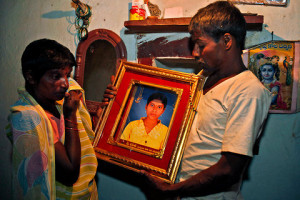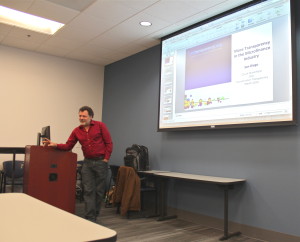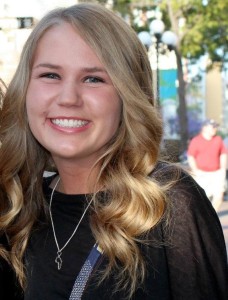MicroFinance Transparency
“Work hard and earn money. Do not take loans.” – Lalitha
By Kristin Klein, Communications Intern
At first glance, the work of Microfinance Transparency (MFTransparency) can seem daunting and confusing. With the mention of acronyms like APR, IPO, ROE, and EIR, paired alongside mathematical equations and graphs to analyze; one might lose sight of what this organization is all about.
I know I sometimes felt this way until I had the opportunity to become an intern. A defining moment for me was getting to hear Chuck Waterfield speak at two events at the college I attended, Point Loma Nazarene University in San Diego. The first thing I noticed about him was his passion for what MFTransparency is doing. When Chuck speaks, he helps you look past all of the numbers in order to get to the heart of their mission. This organization no longer becomes all about collecting and disseminating data, and it instead becomes about protecting the welfare of poor micro-entrepreneurs around the world.

Petla Lalitha’s parents holding up a picture of their daughter in Godhumaguda village, Andhra Pradesh, India. Photo Credits: Mahesh Kumar A./Associated Press
As Chuck put it, he is fighting to put consumer protection in place to protect the poor essentially from ourselves. These poor people receiving microfinance loans usually do not know they are paying exorbitant prices that can reach percentages as high as 126% APR. Chuck’s story is certainly a compelling one – he never intended to start this organization, but instead it was formed out of what he likes to label “seismic changes” in the microfinance industry. He could no longer sit back and remain silent about the problems within the industry when over-indebted borrowers were committing suicide in India. The suicide note left from 18 year old Lalitha is haunting as it reads, “Work hard and earn money. Do not take loans.” Chuck’s solution to the problems he saw was to start the organization MFTransparency. He wanted to start a movement that would inspire institutions to commit to and actually apply a code of ethics that would protect their consumers. He asks the question, “If you are here to work with and help the poor, shouldn’t you be honest about your price?
Therefore, what MFTransparency does is facilitate microfinance pricing disclosure. One country at a time, MFTransparency calls in the heads of microfinance institutions, and encourages each of them to publicly disclose their standardized microloan prices, both to their clients and on the MFTransparency website. This is important because no one usually knows anyone else’s prices. Once the institutions agree to join the process, MFTransparency asks for the completion of an excel-based questionnaire and the submission of client loan documentation. MFTransparency will calculate the APR prices they are charging their borrowers, and will then display all of the institution’s true prices at once.
MFTransparency awards each participating institution with a Seal of Transparency upon completion. This is an internationally respected certification that recognizes institutions that have become transparent in their prices. Though MFTransparency could avoid the entire process and go straight to the clients to expose what the organizations are actually charging, they have never had to because the institutions have been willing to partake in this process to prove their commitment to consumer protection, social performance, and responsible microfinance.
In addition to promoting pricing transparency, MFTransparency also encourages discussion on questions like: How much is too much? And, how much profit should we be making on poor people? Chuck has made the point that every penny of profit comes from the pockets of clients who are at the bottom of the pyramid. He wants to demonstrate which microfinance institutions are fair to their borrowers and transparent on how much they charge and make. He is a firm believer that the temptation of high profits can lead to irresponsible practice in the industry, but that transparency can help bring down prices through pricing competition and informed decision making by borrowers.
MFTransparency calls anyone engaged in or interested in microfinance to look at the pricing data on their website, and to be open to dialogue about what is displayed. The end goal of their work is protect the welfare of poor micro-entrepreneurs around the world. They want to improve the quality of microfinance services offered to clients, and promote best practices within the industry.
Kristin Klein has just completed an internship with MFTransparency, working as a communications intern. Having just finished her International Development Studies degree at Point Loma Nazarene University in San Diego. She has a deep passion for holding nonprofits to greater accountability and her honors research project looked at how U.S.-based nonprofits working in sub-Saharan Africa may or may not distort the region in their promotional materials and communications.






hi,kristin thank you for deep passion for holding non profits to greater accoutability and your honors researc project.As Chuck put it, he is fighting to put consumer protection in place to protect the poor essentially from themselves. These poor people receiving microfinance loans usually do not know they are paying exorbitant prices that can reach percentages as high as 126% APR. Chuck’s story is certainly a compelling one – he never intended to start that organization, but instead it was formed out of what he likes to label “seismic changes” in the microfinance industry. He could no longer sit back and remain silent about the problems within the industry when over-indebted borrowers were committing suicide in India,even in kenya over-indebted bollowers are commiting suicide too.please do something to improve the quality of microfinance services offered to clients, and promote best practices within the industry in the hon of Africa.